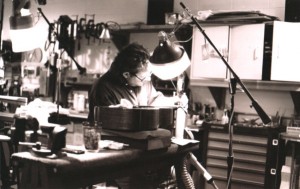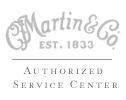Chris Camp – Luthier
I began guitar making and instrument repair almost immediately upon graduation from college in 1975. One day out of the blue I had a very strong and sudden urge to build a banjo or a guitar… I started in my parents basement with very little to go by, as there wasn’t the wealth of information available today, and managed to construct an acoustic guitar made of Indian Rosewood, with a Mohagany Neck, and a clumsy tree-of-life inlay on the fretboard… My dad kept asking me, how in the world did you know how to do this?
Even then, it just seemed natural, challenging and fun! And, of course I loved music and was already deeply involved with different styles of music, both acoustic and electric, and had been instructed in piano, by my mom when I was 7 years old, and had been a functioning member of the Yonkers Kilty Pipe Band from the age of 9, (yes, for some weird reason I wanted to play the bagpipes, and they found me a teacher and a band to play in)… I’d learned to play guitar watching my dad strumming his favorite World War II songs on an inexpensive guitar one of his buddies brought back from South America, and I played electric bass, 5-string banjo, and a little sax & harmonica, so,…I got started early and was in deep by the winter of 1976.
A friend of mine whom I had worked with in college had relocated to Nashville and called to invite me down for a visit as I was instructed that I needed to check out,”The Old Time Pickin’ Parlor”, the obvious natural place for me to go and get my first job as a freshman Luthier. By some miracle, the owner, world reknowned mandolin and guitar maker, Randy Wood and I hit it off and I was hired for fifty dollars a week to keep the place clean and work my way up to repairing and building through osmosis… Sometimes they would even set me off in the wrong direction to see if I would notice or anticipate the upcoming disaster….
Within the first year I was building, repairing, cutting mother of pearl for everyone in town, including the lengendary “Shot Jackson, owner and founder of ShoBud steel guitars, as we had the task of inlaying the bodies of his all wooden pedal steel bodies.
“The Pickin’ Parlor” as it was fondly refered to was a real storybook location. A crossroads for so many unique and talented people. Randy in his vision of the place had merged a musical instrument shop with a very substantial repair and building facility, And, the place was also a venue, you know a night club, one of the hottest spots in town, right around the corner of lower Broadway on Second Avenue.
Anybody who was anybody came to town and played several nights there. And, of course during the day, they tended to hang out upstairs with us in the shop. Now all of a sudden, I’m meeting, picking and repairing for guys like, Danny Gatton, Gatemouth Brown, Lenny Breau, Doc Watson, Bluegrass wizards from all over the South, many of the guys who were touring on the road with the Nashville acts of the day and of course this amazing talent pool of local legends, such as the studio greats of the era like Buddy Spicher, Bucky Barrett, Harold Bradley, Charlie Collins, Charlie Daniels, Chet Atkins… They even flew me back to New York to work on guitars for Aerosmith while they were in the studio recording one of their albums! Whew, was my head spinnin’!
Needless-to-say, within two years I’d been severly spanked into shape as a risk taking, fretted instrument pit crew peon who was being exposed to the real thing at a frightening rate of speed.
Also, bear in mind that the Grand Old Opry, the Exit/In, the Station Inn, and several other local and legendary venues were very popular and we had a never ending stream of repair and modification to do for all the guys and girls (Marshall Chapman, Linda Hargrove, Marcia Ball, Ronnie Stoneman, to name a few) who were playing around town.
During this time, watching and imatating I managed to build some nice guitars across a range of styles and models. All kinds of acoutic flattops, solid body electrics, an archtop, and even a thirty-six string Celtic Harp, all from raw materials with no plans or formal guidance. This is really how I learned to hone my intuitive gift for working in wood with my hands, my head and my heart…
The Pickin’ Parlor experience lasted almost four years, sorta like an undergraduate degree, a double major in music and life. Randy closed up and moved to Savanah, Georgia where he continues his passions and the “eighties” were on the way in and about to close the door on the last leg of the original glory days of the Nashville music scene. I retreated to a spare room in my house and I guess you could say that’s when I first went out on my own as an independent Luthier. I didn’t know it at the time, but, I had received a priceless education that I’ve been building on (no pun intended) ever since.
For the next six or seven years I worked out my home, and continued to build guitars and serve the needs of many interesting professionals whom I had admired. One day I came home and there was a message for me on the machine from one of my all time songwriting heros, the great John Stewart. He was down the street recording an album and needed my help. I was thrilled to meet him, fix his guitar and I had the nerve to ask him if I could keep a rough draft of one of his new songs, written on stationery from the Spence Manor Hotel, a very popular hang at the time. Stewart was flattered that I wanted the lyric and he indulged me…
At that time, the celebrity list kept growing and I was blessed with work from Jimmy Buffett, Rodney Crowell, several of the Music Row songwriters, and all the local guys needing fretjobs, neckresets and help getting their beloved pile of junk to play in tune. By 1986, I was growing restless and wanted to fulfill my dream of living in California. Nashville was not at it’s most glorious and noteable point and there was a general sense that the scene had stalled without anyone really defining the new era with anything very new, innovative or earthshaking… In other words, the scene was stinkin’. All the people who ran Music Row were losing their jobs or running around town with lame acts that lacked the musical horsepower that Nashville had prided itself on and built it’s reputation. So, many of us were discouraged and bored and the excitement of the seventies had been replaced by lawyers brokering deals for low talent bands and singers who weren’t rooted to the tradition…
In the winter of 1988 I made the decision to get a glimse of Nashville in my rear view mirror and follow the Clampets, and my instincts to California. I arrived in Escondido, California, a suburb of San Diego on Christmas Eve, 1989, avoiding insane Los Angeles, and eager to see what I could stir up with a fresh environment and a new set of circumstances.
I’ve been located in Escondido for over twenty years now. I’ve had the pleasure and the privilege of establishing a wonderful business with a diverse selection of musicians from all different styles of music. Shortly after establishing my shop, I called an old aquaintance of mine at the Martin Guitar Co., Mr. Mike Longworth who was head of customer service at the time, and I asked him if he would consider me as a C.F. Martin warrranty station, as I loved their guitars, their history and their family tradition. Mike recalled that I had cut my teeth on repair work at the Pickin’ Parlor with Randy and was excited that I had contacted him. Within six months we were offered the Warranty Service Certification. I’m proud to include that level of legitimacy and service for our customers and we have had the priviledge of working on literally hundreds of C.F. Martin guitars here in Southern California.
Although I don’t have too much time for small repairs and adjustments these days, I do enjoy helping people at any age or skill level become more familiar with their instrument so they can get it working with them instead of against them. Often these customers develop and we wind up helping them with pickup systems and better gear or more substantial modifications as they become more sophisitcated and their needs advance.
Many of the restorations that we’ve done were instruments that belonged to the relatives of our customers, such as a Grandparent or infamous Uncle. So, very often the jobs have what we call, “member of the family status”… Healing a family member has been a very rewarding aspect of our repair service and we know we’ve had the honor of contributing to the family memories of loved ones and the music they made.
Hope to hear from you soon…and remember:
Don’t delay – sing and play, everyday!
Chris Camp


